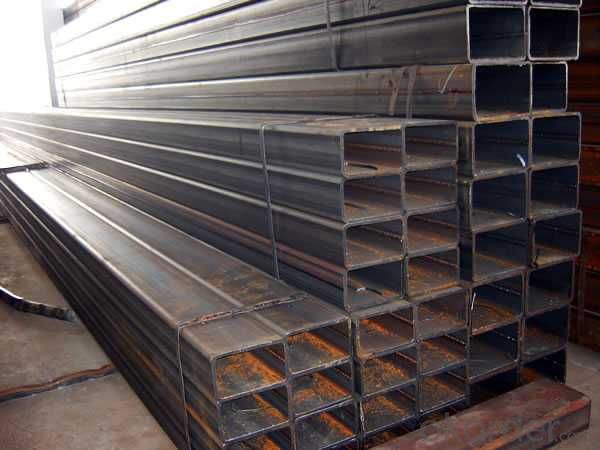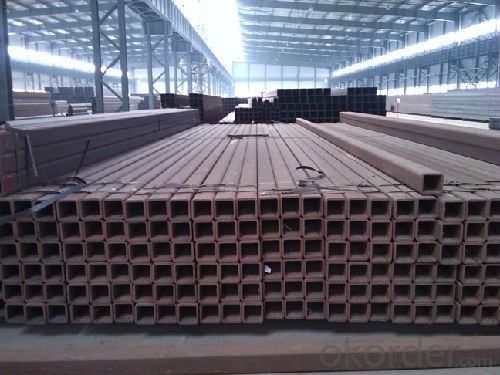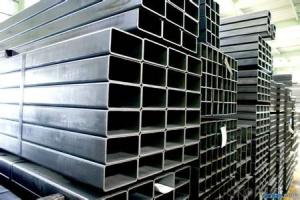API 5L Hot Rolled Black Square Steel Pipe
- Loading Port:
- Tianjin
- Payment Terms:
- TT or LC
- Min Order Qty:
- 25 m.t.
- Supply Capability:
- 10000 m.t./month
OKorder Service Pledge
OKorder Financial Service
You Might Also Like
Product Description:
1、Structure of Hollow Section Steel Pipe Various Size:
The square tubes are used in structural projects, shelves, racks, trailers and in ornamental purpose. The framework made by square steel tubes, is used for providing support to the roof. This framework is also used as roof top ventilation baffles. With compare to round steel tubes, square steel tubes are little more efficient. To be used for construction, furniture structures as well as other fabrication purposes. It is widely used in building, machine, chemical equipment, automobile industrial, container, it is also applied to agriculture and mine machine.
2、Main Features of Hollow Section Steel Pipe Various Size:
• High manufacturing accuracy
• High strength
• Small inertia resistance
• Strong heat dissipation ability
• Good visual effect
• Reasonable price
3、Hollow Section Steel Pipe Various Size Specification:
Standard | ASTM A500, GB6728 |
Grade | A, B, C, Q195, Q235, Q215 |
Thickness | 0.6-10MM |
Section Shape | Square |
Outer Diameter | 10*10-500*500 |
Place of Origin | TIANJIN, China (Mainland) |
Secondary Or Not | Non-secondary |
Application | Hydraulic Pipe |
Technique | HOT-ROLLED |
Certification | CO, MTC, CI, PL |
Surface Treatment | factory state or painted black |
Special Pipe | |
Alloy Or Not | Non-alloy |
Length | 5-12M |
Outer Diameter | 10*10-500*500 |
1) Material: A, B, C, Q195, Q235, Q215
2) Specification range: 10*10-500*500 WT:0.6-10MM ,length:6-12m or according to the requirement of clients.
3) Excutive standards:GB,ASME API5L.ASTM A 106/A53,Despite of the above standards,we can also supply seamless steel pipe with standard of DIN,JIS,and so on,and also develop new products according to the requirements of our clients!
4) Surface:black lacquered,varnish coating or galvanized.
5) Ends:Beveled or square cut,plastic capped,painted.
6) Packing:bundles wrapped with strong steel strip,seaworthy packing.
4、Packaging & Delivery
Packaging Details: | seaworthy package,bundles wrapped with strong steel strip |
Delivery Detail: | 15-30days after received 30%TT |
5、FAQ of Hollow Section Steel Pipe Various Size:
①How is the quality of your products?
Our products are manufactured strictly according to national and internaional standard, and we take a test
on every pipe before delivered out. If you want see our quality certifications and all kinds of testing report, please just ask us for it.
Guaranteed: If products’ quality don’t accord to discription as we give or the promise before you place order, we promise 100% refund.
②How about price?
Yes, we are factory and be able to give you lowest price below market one, and we have a policy that “ for saving time and absolutely honest business attitude, we quote as lowest as possible for any customer, and discount can be given according to quantity”,if you like bargain and factory price is not low enough as you think, just don’t waste your time.Please trust the quotation we would give you, it is professional one.
③Why should you choose us?
Choice happens because of our quality and price. Additionally, we can also offer professional products inquiry, products knowledge train (for agents), fast goods delivery, outstanding customer solution proposals. Our service formula: good quality + good price + good service=customer’s trust.
SGS test is available. Customer inspection before shipping is welcome. Third party inspection is OK.
6、Hollow Section Steel Pipe Various Size Images:


- Q:Are steel pipes suitable for conveying fluids?
- Yes, steel pipes are suitable for conveying fluids. Steel pipes have been widely used in various industries for many years due to their durability, strength, and resistance to corrosion. These qualities make steel pipes an ideal choice for conveying fluids such as water, oil, gas, and even hazardous chemicals. The smooth interior surface of steel pipes also allows for efficient flow and prevents clogging, making them suitable for applications that require a continuous and smooth flow of fluids. Furthermore, steel pipes can withstand high pressure and temperature conditions, making them suitable for both high and low-pressure fluid transmission systems. Overall, steel pipes are a reliable and efficient option for conveying fluids in a wide range of industries, including oil and gas, water treatment, chemical processing, and many more.
- Q:What are the environmental impacts of steel pipe production?
- The environmental impacts of steel pipe production include the extraction and processing of raw materials, such as iron ore and coal, which contribute to deforestation, habitat destruction, and air and water pollution. The manufacturing process also emits greenhouse gases and other pollutants, contributing to climate change and air pollution. Additionally, the disposal of waste materials and the potential for leaks or spills during transportation can harm ecosystems and water sources.
- Q:How are steel pipes used in sewage treatment plants?
- Steel pipes are commonly used in sewage treatment plants to transport wastewater, sludge, and other fluids throughout the facility. They provide a durable and corrosion-resistant solution for the harsh environments found in these plants. Steel pipes are used for various purposes, such as conveying raw sewage, distributing treated water, and carrying sludge for disposal or further processing.
- Q:Can steel pipes be used for geothermal applications?
- Yes, steel pipes can be used for geothermal applications. Steel pipes have high strength and durability, which makes them suitable for handling the high temperatures and pressures involved in geothermal systems. Additionally, steel pipes are resistant to corrosion and can withstand the harsh conditions found deep underground, making them a reliable choice for transporting geothermal fluids.
- Q:How are steel pipes inspected for defects?
- Steel pipes are inspected for defects using various methods, including visual inspection, ultrasonic testing, magnetic particle inspection, dye penetrant testing, and radiographic examination. These techniques help identify any cracks, corrosion, or other defects in the pipes to ensure their structural integrity and prevent any potential hazards or failures.
- Q:How are steel pipes used in the construction of oil storage tanks?
- Steel pipes are commonly used in the construction of oil storage tanks for several purposes. Firstly, they are used to create the framework and structure of the tank, providing strength and durability to support the weight of the stored oil. Additionally, steel pipes are used for the internal and external piping systems of the tank, facilitating the transportation of oil to and from the tank. Finally, steel pipes are also employed for the ventilation and drainage systems of the tank, ensuring proper airflow and drainage to prevent any potential hazards or damage.
- Q:Are steel pipes suitable for use in food processing industries?
- Yes, steel pipes are suitable for use in food processing industries. They are highly durable, corrosion-resistant, and can withstand high temperatures and pressure. Additionally, steel pipes are easy to clean, maintain hygiene standards, and do not contaminate the food being processed.
- Q:How are steel pipes used in construction?
- Steel pipes are commonly used in construction for various purposes such as structural support, plumbing, and transportation of fluids and gases. They are used in building frameworks, bridges, and underground infrastructure, providing strength, durability, and flexibility. Steel pipes are often employed in plumbing systems for water supply and drainage. Additionally, they serve as conduits for conveying gas, oil, and other substances. Their versatility and strength make steel pipes an essential component in modern construction projects.
- Q:What are the common uses of steel pipes in construction?
- Due to their durability and strength, steel pipes are widely used in construction for various purposes. Plumbing systems in buildings commonly rely on steel pipes, which can effectively transport water, gas, and other fluids. Their resistance to corrosion and ability to withstand high pressure make them the preferred choice over alternative materials. Steel pipes are also frequently employed for structural support in construction. They serve as columns or beams, providing buildings with structural integrity and stability. With their capacity to support heavy loads, steel pipes are highly favored in the construction industry. Bridges and highways often incorporate steel pipes into their design. They are utilized to create sturdy and long-lasting bridge supports, guardrails, and signposts. The ability of steel pipes to endure extreme weather conditions and heavy traffic makes them a reliable option for infrastructure projects. Additionally, steel pipes are indispensable for underground utilities like sewer and drainage systems. They offer a robust solution for transporting wastewater and preventing leaks. Moreover, they play a crucial role in constructing underground tunnels and pipelines. Furthermore, steel pipes find application in fencing, scaffolding, and handrails in construction. Their strength, versatility, and ability to withstand harsh environmental conditions make them a preferred choice. In summary, steel pipes are vital components in construction due to their numerous advantages. Their durability, strength, and resistance to corrosion make them a reliable choice for various applications in the construction industry.
- Q:What are the different types of supports used for steel pipes in buildings?
- Some common types of supports used for steel pipes in buildings include pipe hangers, clamps, brackets, and roller supports. These supports are designed to provide stability, prevent sagging or bending, and distribute the weight of the pipes evenly. The choice of support depends on factors such as pipe size, location, and load requirements.
1. Manufacturer Overview |
|
|---|---|
| Location | |
| Year Established | |
| Annual Output Value | |
| Main Markets | |
| Company Certifications | |
2. Manufacturer Certificates |
|
|---|---|
| a) Certification Name | |
| Range | |
| Reference | |
| Validity Period | |
3. Manufacturer Capability |
|
|---|---|
| a)Trade Capacity | |
| Nearest Port | |
| Export Percentage | |
| No.of Employees in Trade Department | |
| Language Spoken: | |
| b)Factory Information | |
| Factory Size: | |
| No. of Production Lines | |
| Contract Manufacturing | |
| Product Price Range | |
Send your message to us
API 5L Hot Rolled Black Square Steel Pipe
- Loading Port:
- Tianjin
- Payment Terms:
- TT or LC
- Min Order Qty:
- 25 m.t.
- Supply Capability:
- 10000 m.t./month
OKorder Service Pledge
OKorder Financial Service
Similar products
New products
Hot products
Related keywords






























